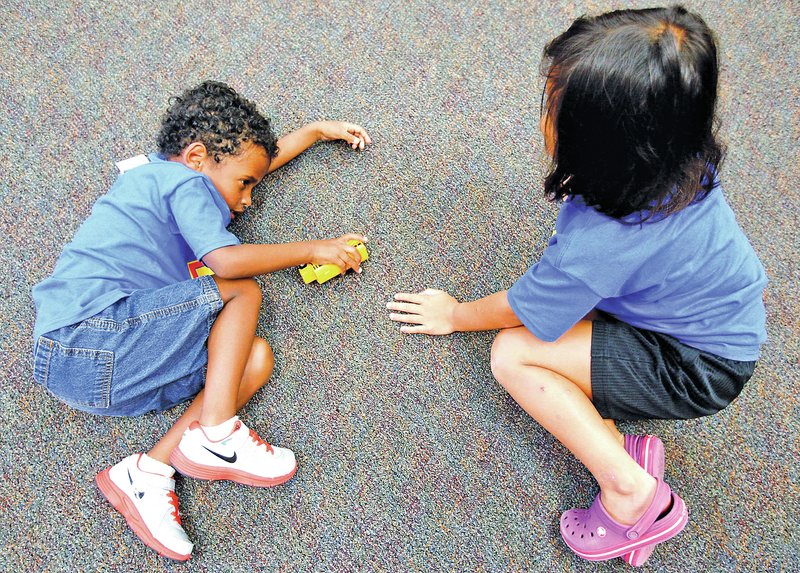ROGERS -- The children at Camp Connect think they are just there to play, and that's how Peggy Schaefer Whitby wants it.
The camp -- held this week at Fellowship Bible Church in Rogers -- paired children age 5 to 8 with autism and children without. Social interactions are the lessons buried in playtime at Camp Connect. Peer mentors learn to be accepting and children with autism learn how to related to children their own age.
At A Glance
Points Of Contact
• First Connections serves children up to 3 years old who have special needs, including autism. For more information call 800-643-8258.
• Centralized Intake and Referral/Consultant Unified Intervention Team, helps connect children ages 3 to 21 to special services through the Arkansas Department of Education. For more information call 501-682-4221.
• Arkansas Project Connect works to connect parents of autistic children with available services. For more information call 855-617-0013.
Source: Staff Report
"There's many things that these kids will do with other kids that they won't do with me," said Schaefer Whitby, assistant professor of special education curriculum and instruction at the University of Arkansas.
Life isn't segregated by ability, Whitby said.
"By beginning early, with helping kids accept children who are different, we can make the world a better place," she said.
Camp Connect is an extension of Project Connect at the College of Education and Health Professions designed to assess Arkansas' ability to help families with autism.
Autism is a spectrum of disorders, Whitby said. Autism affects social and communication skills, and behavior, but the three can be intertwined.
"They want to be friends, but they don't know how," she said.
The spectrum of autism includes children with high intelligence and children who are both autistic and have been diagnosed with intellectual disabilities, she said. A child might resist socializing with other children. If he doesn't know how to say what he wants, a child may have a tantrum. Families can feel isolated because it's easier to stay at home than go out, she said.
One in 65 children will be diagnosed with autism by the time he or she is 8, according to an Arkansas report from the Autism and Developmental Disability Network. Boys are more likely to have the disorder-- 1 in 40 boys and 1 in 172 girls in Arkansas are diagnosed as autistic.
Graduate students practice applied behavior analysis with children at the Family Service and Research Clinic at the University of Arkansas. They led sessions for undergraduate students in the mornings before Camp Connect began.
Applied behavior analysis is the science of human behavior, said Elizabeth Lorah, assistant professor of special education curriculum and instruction.
When a driver sees a stop sign, he stops. He doesn't get hit by a car, and that reinforces the need to stop at the intersection, she said.
A child with autism might not communicate what he wants because communication is hard for him. He might just break down. If he gets what he wants without being forced to communicate, it reinforces the negative behavior. If he has to ask, it reinforces asking.
"We're just arranging the stop signs," Lorah said.
Applied behavior analysis is about finding why a child has behavioral problems, not just telling him to stop, said Ashley Parnell, graduate assistant.
As a former special education teacher, she often had autistic children placed in her class, but she didn't know how to teach them.
"Way to go," may be wasted on an autistic child, she said, because those are social words he doesn't understand.
She's an autism consultant for a state program working with children in their homes. Children who didn't speak can connect words with a favorite activity, object or snack, and that can lead to entire sentences, she said.
Early efforts to teach children to speak are crucial, said Karan Burnette with Partners for Inclusive Communities. Burnette directs Arkansas Autism Partnership, the home-based autism program.
"We know what to do with these children, what interventions to use," Burnette said.
State funding caps the program at 100 children ages 18 months through 7 years, Burnette said. There's a waiting list, but late diagnosis is a bigger problem for families who could benefit from the program. Children can get intensive home therapy for up to three years through the program. However, if they don't make it into the program before turning 5, they have "aged out," Burnette said.
About a third of children who were eventually diagnosed with autism spectrum disorder were screened for developmental concerns before they turned 3, according to the Autism and Developmental Disability Network. The average child wasn't diagnosed until age 5, according to the network.
Parents should take concerns they have about a child's development to their pediatrician, Whitby said.
"Usually moms and dads are right. If they have concerns they need to see somebody," she said.
One day when Whitby checked in on the play kitchen, she said four children were playing and sharing toys. The untrained eye wouldn't have known which children had autism and which didn't. She told the group of children she wanted to play, too. One of the playmates told her she could go take a nap.
That's when she knew the camp was a success.
"They didn't want me there," she said.
NW News on 07/26/2014
